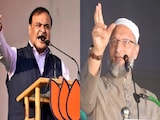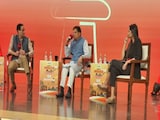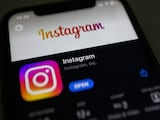July 20, 1969, marked a defining moment in human history as Apollo 11 astronaut Neil Armstrong took his historic steps onto the lunar surface, uttering the immortal words, "That's one small step for man, one giant leap for mankind." The culmination of years of scientific endeavour and human ambition, Mr Armstrong's Moon landing remains an enduring symbol of human achievement and exploration. It took 400,000 NASA employees and contractors to make Mr Armstrong and Buzz Aldrin land on the Moon.
But with great achievement, came greater controversy. And one man was behind spreading it.
Bill Kaysing, who loosely worked on the US space mission between 1960 and 1963, started the notion - with conviction - that the US lacked technical prowess to make it to the Moon, according to a report in The Guardian.
He was an employee of Rocketdyne, the company that helped design the Saturn V rocket that took Mr Armstrong and Mr Aldrin to the Moon.
Bill Kaysing self-published a pamphlet that contained some outrageous theories.
Photo Credit: billkaysing.com
Convinced in his belief, Mr Kaysing self-published a pamphlet 'We Never Went to the Moon: America's Thirty Billion Dollar Swindle' that contained grainy photos and some outrageous theories.
He questioned why there are no stars in the pictures of the Moon landing released by the US government. Further, Mr Kaysing pointed out that there is no blast crater under the landing module, along with highlighting the way the shadows fall.
"It's well documented that NASA was often badly managed and had poor quality control," Mr Kaysing told Wired in 1994. "But as of 1969, we could suddenly perform manned flight upon manned flight? With complete success? It's just against all statistical odds."
Till his death in 2005, he maintained that the whole thing was a fraud, filmed in a TV studio.
His queries created doubt in the minds of people that are kept alive even today in Hollywood movies and Fox News documentaries, Reddit forums and YouTube channels.
Among those who believe and raise doubt on NASA's mission are podcaster Joe Rogan and YouTuber Shane Dawson. A sociology professor in New Jersey was exposed last year for telling his students the landings were fake.
But the US space agency has expressed disappointment on the propagation of these theories.
"The reality is, the internet has made it possible for people to say whatever the hell they like to a broader number of people than ever before," Roger Launius, a former chief historian of NASA, told The Guardian. "And the truth is, Americans love conspiracy theories. Every time something big happens, somebody has a counter-explanation."
NASA presented extraordinary volume of evidence - 382 kg of Moon rock collected across six missions; corroboration from Russia, Japan and China; and images from the Nasa Lunar Reconnaissance Orbiter showing the tracks made by the astronauts in the Moondust.
Still, Moon-hoax conspiracy has blossomed since 1969.















